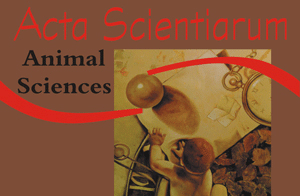ABSTRACT.
Leptospirosis is an infectious disease that affects practically all domestic and wild animals, which can become carriers and, as a consequence, will contribute to the spread of the microorganism in nature. The present study aims to detect the occurrence of leptospirosis against by the microscopic serum agglutination test in animals at the Zoo of the Centro Universitário da Amazônia (ZOOUNAMA). 26 adult animals of both sexes and of the following species: 9 Sapajus apella, 2 Cebus kaapori, 3 Ateles marginatus, 10 Ateles paniscus, 1 Chiropetes satanas, 1 Allouata belzebul. Of the animals studied, 3 (11.5%) were reagents to be taken against Leptospira spp. The serovars found in the different species were: Icterohaemorragiae, Balum, Hardjo and Grippothyphosa. SAM proved to be efficient to detect against leptospira in non-human primates. Icterohaemorragiae type serum occurred with research results showing that it is also important in leptospirosis in non-human primates.
Keywords:
antigen; epidemiology; Leptospira

 Thumbnail
Thumbnail
